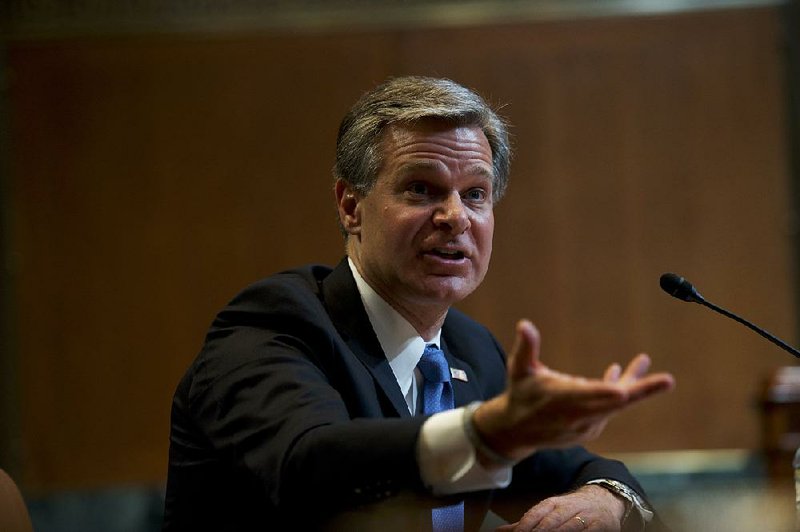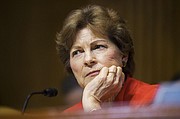WASHINGTON -- FBI Director Christopher Wray said Tuesday that he does not consider court-approved FBI surveillance to be "spying" and that he has no evidence the FBI illegally monitored President Donald Trump's campaign during the 2016 election.
His comments at a Senate Appropriations subcommittee hearing broke from Attorney General William Barr, who has described as "spying" FBI surveillance during its investigation into whether the Trump campaign and Russia colluded. Barr has not said such surveillance was necessarily improper, but Trump nonetheless seized on those comments to suggest that his campaign was spied on in an illegal and unprecedented act.
Asked by Sen. Jeanne Shaheen, D-N.H., if he would say that the FBI is "spying" when it investigates suspected terrorists and mobsters while following "investigative policies and procedures," Wray replied, "Well, that's not the term I would use."
He added: "I believe that the FBI is engaged in investigative activity, and part of investigative activity includes surveillance activity of different shapes and sizes. And to me, the key question is making sure that it's done by the book, consistent with our lawful authorities. That's the key question. Different people use different colloquial phrases."
Asked whether he believed FBI agents spied on Trump's 2016 campaign, Wray replied: "I want to be careful in how I answer that question here, because there is an ongoing inspector general investigation. I have my own thoughts based on the limited information I have seen so far."
Shaheen pressed him further, asking whether he had any evidence that illegal surveillance was conducted on individuals associated with the campaign.
"I don't think I personally have any evidence of that sort," Wray said.
Wray, who took over the bureau in 2017, urged lawmakers to wait for the findings from Justice Department Inspector General Michael Horowitz, who is expected to issue a report in a month or two about the origins of the FBI investigation into the Trump campaign, and the law enforcement tools that were used, including foreign intelligence surveillance court orders.
The recently concluded investigation from special counsel Robert Mueller did not find a criminal conspiracy between the campaign and the Kremlin to tip the outcome of the 2016 presidential election.
"The attorney general is seeking to understand better the circumstances at the department and the FBI relating to how this investigation started, and we're working to help him get that understanding," Wray said about the Justice Department's review. "I think that's part of his job and part of mine."
Barr didn't specify what he meant when he said he believed there had been spying on the Trump campaign, though he also said he did not mean the word in a negative way. At a hearing last week, he described "spying" as a "good English word" encompassing "all forms of covert intelligence operations" and said he wouldn't back away from using it.
At that hearing, Barr said he wanted to explore whether any Justice Department rules were violated in the course of the investigation of people associated with the Trump campaign. "Frankly, to the extent that there were any issues at the FBI, I do not view it as a problem that's endemic to the FBI. I think there was probably a failure among a group of leaders there in the upper echelon," Barr said.
Republicans have accused former FBI leaders of using flimsy or false claims to get court surveillance orders on former Trump adviser Carter Page in 2016 and 2017. They have also accused senior FBI officials of political bias against Trump.
The New York Times reported last week that the FBI sent a female government investigator posing as a research assistant to speak with ex-Trump campaign adviser George Papadopoulos, who was told by a Maltese professor in the spring of 2016 that Russia had "dirt" on Democrat Hillary Clinton in the form of stolen emails.
In his book about his entanglement in the Russia probe, Deep State Target, Papadopoulos wrote that the woman, who identified herself as Azra Turk, asked him about his work with the Trump campaign.
"She wants to know: Are we working with Russia?" he wrote. He described her question as "creepy" and said he told her he had "nothing to do with Russia."
Papadopoulos later pleaded guilty to lying to the FBI about his interactions with the professor, Joseph Mifsud, and was sentenced to 14 days in prison.
About a month after the investigator met with Papadopoulos, the FBI obtained a court-approved warrant to wiretap Page, who had contacts with Russian intelligence. Page was not affiliated with the campaign when the FBI sought the secret wiretap. Page was never charged with a crime.
Neither the London operation nor the secret wiretap seemed to have yielded fruitful information for the FBI. But critics of the FBI, including Trump, have pointed to the wiretap and London operation as evidence of spying.
Current and former FBI officials have defended the agency's actions, saying they were obligated to investigate allegations of wrongdoing.
Information for this article was contributed by Eric Tucker and Michael Balsamo of The Associated Press; by Devlin Barrett of The Washington Post; and by Adam Goldman of The New York Times.
A Section on 05/08/2019

